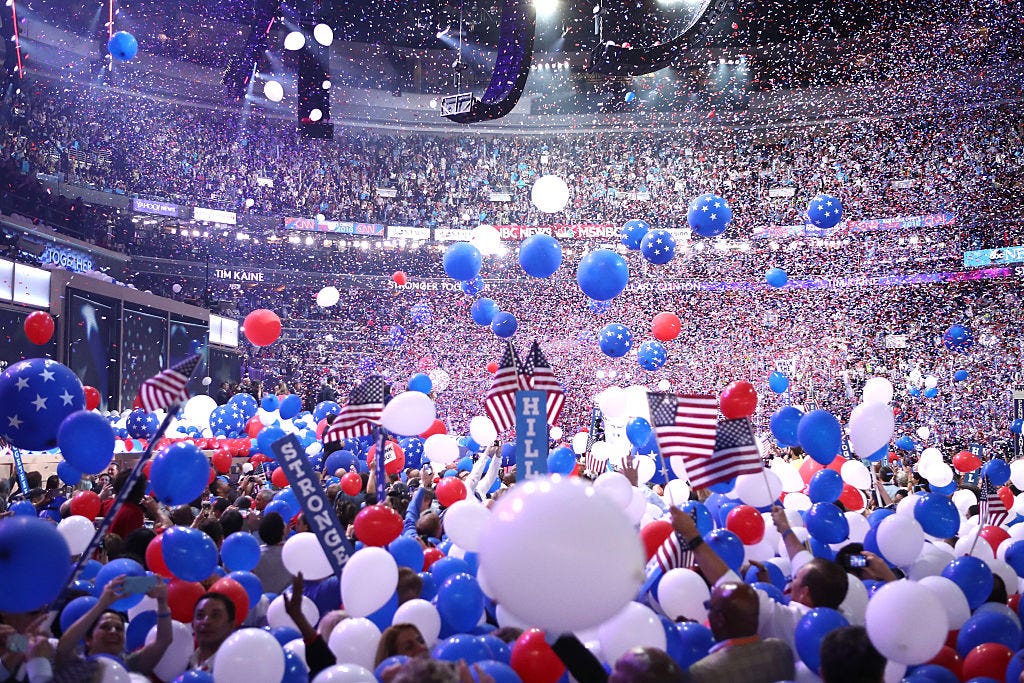How Lobbyists Could Select the Democratic Presidential Nominee
If President Joe Biden decides to step aside after the DNC convention, the decision to replace him falls to a small group of corporate lobbyist and partisan insiders.
President Joe Biden mumbled and lost his train of thought at times during the first debate last night. His stumbling performance sent shockwaves through the party establishment and cemented months of concern about the president's cognitive ability. Democratic pundits on MSNBC and CNN sounded the alarm.
Even Kate Bedingfeld, Biden's former spokesperson, took a swipe at her former boss, calling him "really disappointing" and noting that the president only had to prove that he "had the energy, the stamina -- and he didn't do that."
Many news outlets are now reporting on the very real possibility that Biden could be replaced. But there is little discussion of the process and the identities of the corporate lobbyists working as DNC party insiders—many of whom actively lobby for Silicon Valley giants, health insurance conglomerates, and the financial services sector—who could have an outsized influence in selecting the new presidential nominee. Earlier this month, the Florida Democratic Party affirmed the role of even a Boeing lobbyist as DNC member — also known as a superdelegate — the insider group that, under certain circumstances, could select the new presidential candidate.
Given that the Democratic presidential primaries have concluded, there is no time for voters to replace Biden directly should he decide to step aside. That leaves two options. If Biden steps down between now and the Democratic National Convention, held in Chicago starting on August 19th, the decision to replace him goes to 739 superdelegates and 3,933 pledged delegates — who will go through rounds of voting on the convention floor to select a new stalwart to lead the party as a candidate.
The convention path would lead to an open contest among various factions of the party faithful. The pledged delegates were chosen during the primaries and are composed of a mix of local activists, state party officials, Biden campaign officials, and volunteers. If Biden steps down, his pledged delegates will become unbound, free to back alternative candidates. The new presidential candidate could be anyone. During the 1968 DNC convention, the last brokered convention, delegates chose Hubert Humphrey, who did not even run in the primaries as a candidate.
But if Biden remains on the ticket past the convention, things get a bit more funky. The Democratic National Committee rules state that in the event of a national ticket vacancy, the replacement process falls to an internal committee known as the DNC Rules and Bylaws Committee and a set of insiders known as superdelegates.
The DNC Rules and Bylaws Committe and the roster of superdelegates, however, do not fully represent the diversity of the Democratic Party. As I’ve previously reported, the committee is chaired by Minyon Moore, an influential lobbyist who previously served as an aide to Bill and Hillary Clinton and now works at Dewey Square Group. DSG has worked for a variety of corporate interests. Lyft tapped DSG to fight proposals in California and Massachusetts that would force the company to provide benefits and minimum wages to its drivers.
Moore, who is simultaneously serving as the Democratic convention chair in Chicago this year, served as a board member with the Black Lives Matter Foundation, the group that spent $6 million in donations raised after George Floyd's death to purchase a mansion in Los Angeles. Moore’s firm, Dewey Square Group, was also retained by the BLM Foundation in 2020 and 2021 and received over $1.2 million.
James Roosevelt, Jr., the grandson of President Franklin D. Roosevelt, is the other co-chair of the DNC Rules and Bylaws Committee. He is a registered lobbyist with the law firm Verrill in Boston, Massachusetts, where he guides various healthcare interests. He previously served as the chief executive of the Tufts Health Plan, a health insurance company that is now part of Point32Health.
Jaime Harrison, the chair of the DNC and former corporate lobbyist, spent the last four years retaining and adding corporate advisers as superdelegates, including:
— Bel Leong-Hong, a consultant whose clients have included Lockheed Martin, GE Capital Financial, and ITT Industries.
— Scott M. Brennan, a Des Moines, Iowa attorney who works in the government relations wing of Dentons, the law-lobbying firm. Dentons lobbies on behalf of ByteDance (the parent company of TikTok), J.P. Morgan Chase, and PhRMA, the drug industry group, among other clients.
— Joe Andrew, the former DNC chairman, who now also works at Dentons, and previously served as the law-lobbying firm’s global chairman.
— Dick Gephardt, the former lawmaker, serves as a DNC super delegate, and lobbies on behalf of Boeing and the hedge fund Silver Point Capital.
— William Owen, a Tennessee-based lobbyist who runs a lobbying firm called Asset & Equity Corporation.
— Maria Cardona, a partner at Dewey Square Group lobbying firm alongside Minyon Moore.



